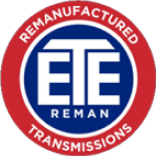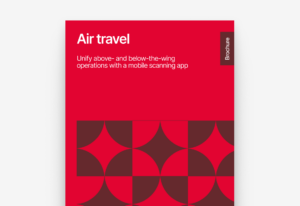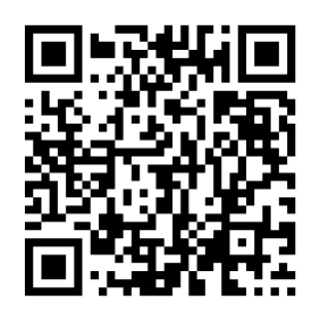Scanbot SDK has a new look
Scanbot SDK began its life in 2011, when we set out to revolutionize document management. Today, we are proud to count many industry-leading companies among our customers, including DocuSign, Deutsche Bahn, Deutsche Telekom, AXA, Procter & Gamble, Motive, and Rimi Baltic.
As we matured as a company, we recognized the need for our brand to reflect this evolution. That’s why we introduced a new design system in 2023 – one that better embodies our focus on enterprise solutions, our values, and our commitment to fast, reliable, and user-friendly software.

This new design system is embodied in our company logo, our brand colors, a new font, and the look and feel of our website. We hope you’re just as happy with these changes as we are.
Product releases
In 2023, we’ve made substantial improvements to all our SDKs, further optimizing their speed, accuracy, size, and feature set. In addition, we expanded our product offering by introducing two new SDKs for cross-platform development – .NET MAUI and Capacitor – and taking the first step in an exciting new direction: Our Barcode Scanner SDK is now available for Linux-based servers and embedded systems.
Linux Barcode Scanner SDK

We have reached a major milestone in our efforts to provide our customers with all the tools they need for their diverse use cases: The Linux Barcode Scanner SDK has left the alpha stage and is now in closed beta.
By deploying it on servers or embedded systems, you can bring the Scanbot SDK’s functionalities to virtually any connected device with a built-in camera. For example, you can use the Linux Barcode Scanner SDK to turn autonomous drones into flying barcode scanners that make inventory management in large warehouses a breeze.
Want to join the Linux SDK’s closed beta? Then email us at beta@scanbot.io!
.NET MAUI SDK

This summer, we also brought our SDKs to the .NET MAUI framework for cross-platform app development.
.NET MAUI lets developers create native user interfaces and applications for multiple platforms using a single codebase. In comparison to its predecessor, Xamarin.Forms, it promises better performance, increased productivity, and a more streamlined developer experience. The two frameworks currently coexist, but .NET MAUI is planned to replace Xamarin entirely by May 2024, when Microsoft’s official support for Xamarin ends. Of course, Scanbot SDK will continue to support the older framework.
Capacitor SDK

Cordova is one of the most commonly used development SDKs for mobile platforms, but its popularity is waning. Capacitor, the app runtime developed by Ionic, offers a viable alternative.
We’ve been offering our Barcode Scanner SDK, Document Scanner SDK, and Data Capture SDK as Cordova plugins that are also compatible with Ionic Capacitor. Now, however, we also offer SDKs for Capacitor specifically, so our customers can make full use of the capabilities provided by Ionic’s framework.
We’ve already released the Capacitor Document Scanner SDK and the Capacitor Data Capture SDK. Currently, we’re working on a standalone Capacitor Barcode Scanner SDK. Stay tuned for further updates!
Notable success stories
We’re glad to have been able to help our customers with many fascinating use cases again this year. Here are just three of these success stories:
ETE REMAN

ETE REMAN is the largest remanufacturer of automatic transmissions and other drivetrain components in the United States. It is a B2B supplier to the automotive repair industry and other resellers.
The company was aware of customers’ frustration over the app’s inability to simply scan VINs from work orders or vehicles. However, ETE REMAN’s team deemed it impractical to develop an OCR scanner from the ground up.
A trial of the Scanbot SDK demonstrated its impressive reliability and ease of integration. The VIN scanner was pivotal in driving customer adoption of the newly released app and has greatly simplified lookups of price and delivery information for transmissions. This, in turn, empowered ETE REMAN’s B2B customers to quote prices to their end consumers promptly.
The Luke Commission

Since 2005, The Luke Commission has been providing the people of Eswatini, Southern Africa, with free, compassionate, and comprehensive healthcare. In 2022, it counted over 217,000 outpatient visits.
In order to quickly onboard new patients, The Luke Commission was looking for a reliable barcode scanning solution to integrate into its mobile apps. Eswatini’s ID cards use a PDF417 barcode with a custom data structure many barcode readers cannot process. The Luke Commission needed a solution that would scan these barcodes flawlessly and could be seamlessly integrated into their mobile apps.
The Scanbot Barcode Scanner SDK was successfully integrated into The Luke Commission’s iOS and Android apps within just two weeks. It scans the special PDF417 barcodes on Eswatini’s ID cards rapidly and flawlessly, which cuts the time spent on data entry by 75%. Scanning works so well that The Luke Commission plans to also use the SDK for inventory management in the future.
WEISSER RING e.V.

WEISSER RING is a German non-profit organization that provides support to crime victims. Across the country, almost 3,000 volunteers offer the victims an open ear and emotional support. Depending on the case, the association also provides financial assistance.
For their work, volunteers need to collect relevant information and important documents. However, exchanging these documents between the local helpers and the WEISSER RING headquarters in Mainz by mail or fax is a large administrative and financial burden. The resulting delays impede the rapid assistance that is so necessary for victims. Additionally, there are considerable data protection problems.
To solve these problems, WEISSER RING developed an app that uses the Scanbot Document Scanner SDK to digitize documents. With this tool, volunteers can now scan and transfer the documents rapidly and in compliance with data protection laws.
Resource highlights
We’ve added a variety of useful industry resources for our website visitors this year. Here are some of the highlights:
State of Multichannel Retail 2023: Exploring U.S. Consumer Preferences and Expectations

We asked 1,000 American consumers 15 questions about their preferences regarding online and offline shopping, multichannel retail, and self-checkout technology. The results show that consumers value both online and offline shopping, but for different reasons: While online shopping is all about convenience, physical stores offer them the advantage of inspecting and feeling the products and taking them home right away without having to wait for delivery. Retailers that offer their customers both channels have a clear advantage over their competitors.
Air travel: Unify above- and below-the-wing operations with a mobile scanning app

With airlines and airports recovering from the effects of the COVID-19 pandemic, there is a need to align cost-efficient processes with high levels of passenger satisfaction. An application with scanning capabilities solves this problem, as it can be installed on as many smartphones or tablets as necessary. We take a closer look at how you can use barcode scanning and document scanning to efficiently process baggage tags, boarding passes, and passports.
What is “New Retail”?

In recent years, supermarket chains in China have successfully tested new and innovative business models which Western retailers can draw inspiration from. These are often summed up under the heading “New Retail”. The goal is to make grocery shopping more enjoyable and convenient for customers, increasing their loyalty to the store. We distilled five aspects that are crucial for supermarkets in the West that want to adapt the concept.
Blog highlights
Technical content has been a major focus for us in 2023, with our developers sharing their knowledge in dedicated posts. Here are some of this year’s highlights from our blog:
Developing a scanning SDK for Windows: A first-hand account

One of our software engineers shares his experiences with developing our new Windows SDK. Trials and tribulations await.
.NET MAUI vs. Xamarin: Should you make the switch?

With the recent release of .NET MAUI, a new framework for building multi-platform applications, many developers are considering making the switch from Xamarin. We take a closer look at both frameworks to help you determine which one is the right fit for you.
How to create a Compose Multiplatform iOS and Android application with barcode scanning functionality using the Scanbot SDK

Compose Multiplatform enables developers to write UI code compatible with both Android and iOS. We walk you through the integration process with the Scanbot Barcode Scanner SDK.
We look forward to working with you again in 2024!
Let us end our recap of 2023 with a small insight into what’s on the horizon for the next twelve months.
Besides ensuring that we always support the current operating systems, development platforms, and end users’ devices, we have massive releases planned for 2024. Features coming to the SDK soon include:
- Improvements to the Machine Learning-based detection of documents, barcodes, and data
- New and substantially improved image filters
- Support for additional barcode types
- Version 3 of the Scanbot SDK OCR engine for data extraction
Furthermore, we will significantly improve the SDK’s Ready-To-Use UI screens by updating their style and making them even more configurable to suit the requirements of your individual use cases.
We would like to thank our customers for the trust they put in us and the valuable feedback we received from them throughout the year. It allowed us to further improve our products and provide even more value going forward.
The Scanbot SDK team wishes you a pleasant end of the year and looks forward to working with you in 2024!







